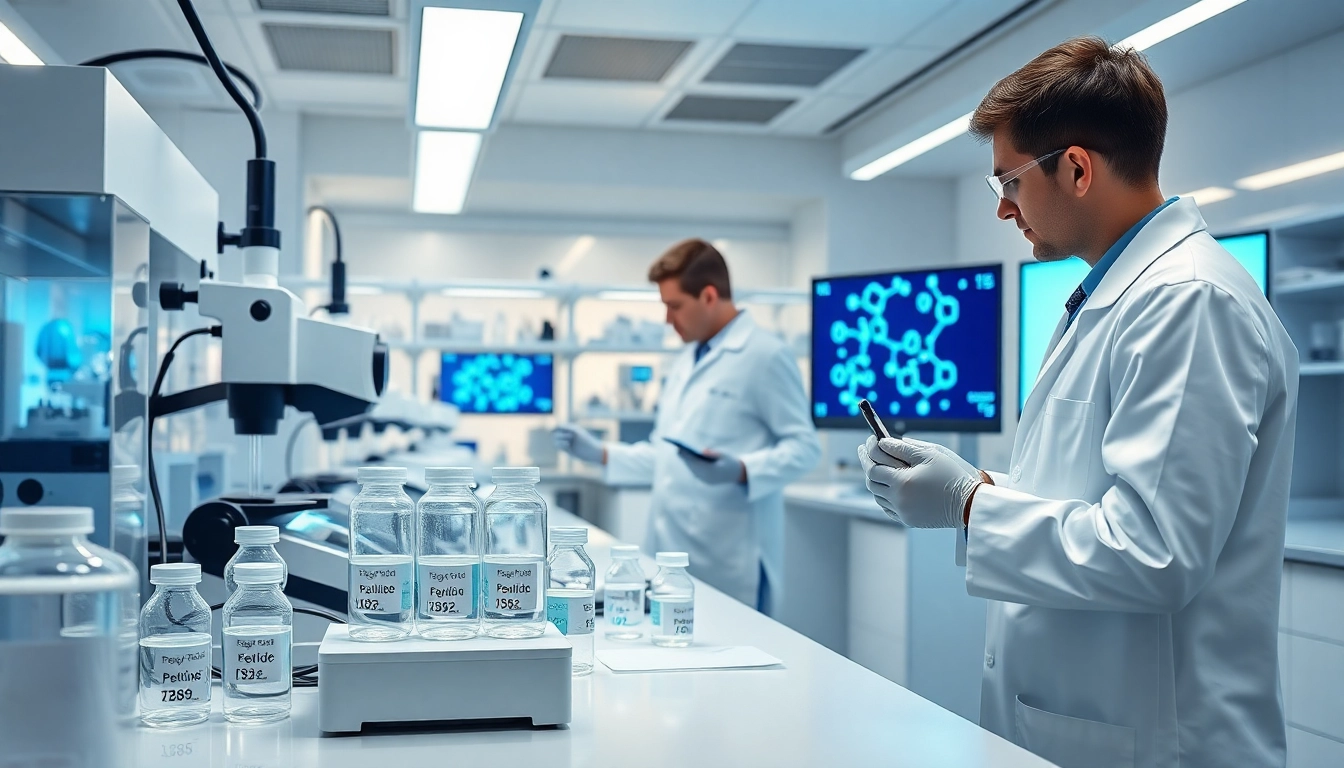The Importance of Peptides in Modern Science
Peptides have emerged as critical components in various scientific fields, especially in biochemistry and pharmacology. These short chains of amino acids play vital roles in signaling pathways, biological functions, and therapeutic applications. As we move further into 2025, the significance of peptides continues to grow, underlining the need for researchers and professionals to understand their properties and uses. When exploring options to buy peptides, it’s essential to comprehend not just their biological implications but also the practical aspects of acquisition and application.
What Are Peptides and Their Functions?
Peptides are essentially short strings of amino acids, typically comprising 2 to 50 amino acids linked by peptide bonds. They can function as hormones, neurotransmitters, and enzymes, playing pivotal roles in cellular signaling and regulation. For example, insulin is a peptide hormone that regulates glucose levels in the body, demonstrating how peptides participate in essential physiological processes.
Moreover, peptides can influence several bodily functions, including metabolism, immune responses, and tissue repair. Research indicates that modifying peptide structures can enhance their efficacy and specificity, fostering the development of novel therapeutic agents targeting various diseases, from diabetes to cancer.
Role of Peptides in Research and Development
In the realm of research and development, peptides are invaluable tools. Their ability to mimic natural biological processes makes them ideal candidates for drug design and development. Many pharmaceutical companies utilize synthetic peptides in preclinical and clinical trials to evaluate new treatments. This strategy not only accelerates the drug discovery process but also reduces the potential for adverse effects by allowing for precise targeting of biological pathways.
Furthermore, peptides serve as biomarkers in diagnostics, facilitating early detection of diseases. The ongoing exploration of peptide-based vaccines, particularly in the context of cancer immunotherapy and infectious diseases, is a testament to their diverse applicability in modern science.
Common Misconceptions About Peptides
Despite their growing popularity, misconceptions about peptides abound. One common myth is that peptides are synonymous with steroids. While both can influence muscle growth and performance, peptides generally have distinct mechanisms of action and are often safer with fewer side effects. Another misconception is the belief that all peptides are intended for human use; in reality, many peptides are designed for research purposes only and may not be suitable for direct human consumption.
By clarifying these misconceptions, we can foster a more informed dialogue about the potential and limitations of peptides in various applications.
Where to Buy Peptides: Understanding Your Options
As interest in peptides grows, so do the avenues for purchasing them. Understanding where to buy peptides is crucial for researchers, healthcare professionals, and enthusiasts alike. The choices can range from specialized online suppliers to local stores, each with its pros and cons.
Online vs. Local Suppliers: Pros and Cons
Purchasing peptides online often offers a broader selection, competitive pricing, and the convenience of home delivery. Reputable online suppliers typically provide extensive product information, including purity levels, synthesis methods, and customer reviews, allowing for an informed buying decision. However, potential drawbacks include the risks associated with sourcing from less reputable sites and longer shipping times.
On the other hand, local suppliers may provide the advantage of immediate access and the ability to examine products in person. Yet, their stock might be limited, and prices may not be as competitive as those found online. Ultimately, the choice between online and local suppliers depends on individual needs, urgency, and the importance of supplier reputation.
Evaluating the Quality of Peptide Vendors
When selecting a peptide vendor, quality should be a top priority. Key factors to consider include:
- Purity: Look for vendors that provide certificates of analysis (CoA) confirming the purity of their products, ideally 95% or higher.
- Reputation: Research customer reviews and feedback on platforms like Reddit or specialized forums to gauge vendor reliability.
- Sourcing and Manufacturing Practices: Vendors should transparently disclose their synthesis process, materials used, and whether they adhere to Good Manufacturing Practices (GMP).
Taking the time to evaluate these criteria can mitigate the risk of purchasing subpar products that may not meet research needs or therapeutic applications.
Price Ranges and Budgeting for Peptides in 2025
The price of peptides can vary significantly based on several factors, including purity, supplier location, and synthesis complexity. Typically, research-grade peptides can range from $10 to several hundred dollars per milligram. For those planning to buy peptides in bulk, negotiating prices with suppliers is often feasible and can result in substantial cost savings.
Budgeting for peptide purchases in 2025 will require careful consideration of project needs, as well as potential fluctuations in market prices. It’s advisable to allocate sufficient funds for high-quality peptides to ensure the integrity of research and therapeutic outcomes.
Key Factors to Consider When Buying Peptides
Beyond understanding the purchasing options, several critical factors must be considered when buying peptides to guarantee their effectiveness and safety.
Purity and Quality Standards in Peptide Purchases
Purity is paramount in peptide purchases, as even slight impurities can lead to significant discrepancies in research results. Established vendors provide detailed information regarding the purity levels of their peptides, often through CoA. Researchers should prioritize suppliers who demonstrate transparency in their manufacturing processes and quality control measures.
Additionally, understanding the differences between research-grade and pharmaceutical-grade peptides is essential. Research-grade peptides are typically used in laboratory settings, while pharmaceutical-grade peptides meet stricter regulatory standards for human use, making them more suitable for therapeutic applications.
Shipping and Handling Considerations
Peptides are sensitive compounds that require careful handling and shipping conditions to maintain stability. Many peptides require refrigeration, or even freezing, during transport. When choosing a vendor, inquire about their shipping methods and how they ensure temperature control during transit. Fast shipping times can also be critical for time-sensitive research projects, so consider vendors that offer expedited shipping options.
Legal Regulations Surrounding Peptide Purchases
The legal landscape surrounding peptide purchases varies by region and may impact accessibility. In some areas, certain peptides may be classified as controlled substances, necessitating compliance with specific regulations. It’s crucial to stay informed about local laws governing peptide acquisition, especially for those planning to use them for therapeutic purposes.
Additionally, ensure that the vendor operates within legal frameworks, reducing the risk of sourcing prohibited substances.
Best Practices for Using Peptides Effectively
Acquiring peptides is only the first step; employing them effectively is equally important. Establishing best practices for peptide use can enhance their efficacy and safety in both research and therapeutic settings.
Dosage Guidelines and Administration Techniques
Determining appropriate dosages is vital, as the optimal amount can vary depending on the specific peptide and its intended use. Many peptides come with suggested dosage ranges that should be followed to minimize risks. Consulting relevant literature and collaborating with experts in the field can provide valuable insights into effective dosing strategies.
Moreover, understanding the correct administration method—whether subcutaneous, intravenous, or intramuscular—is crucial. Each method can have different implications for absorption rates and overall effectiveness.
Storage and Stability of Peptides
Proper storage is critical to preserve peptide stability. Most peptides should be stored in a cool, dry place away from light, and many require refrigeration or freezing. Following manufacturer’s guidelines on storage conditions can substantially prolong the shelf life and maintain the potency of the peptides.
Regularly inspect stored peptides for any signs of degradation, such as changes in color or consistency, and be aware of their expiration dates.
Monitoring Effects and Efficacy of Peptides
Whether in research or clinical use, monitoring the effects and efficacy of peptides is essential to understanding their impact. This includes tracking physiological responses, potential side effects, and overall outcomes. Employing standardized protocols for measurement and evaluation will enhance the reliability of findings and inform future peptide applications.
Future Trends in Peptide Research and Purchasing
As we look ahead to 2025 and beyond, several trends are poised to shape the landscape of peptide research and purchasing.
Emerging Technologies and Their Impact on Peptides
The advent of technologies such as CRISPR gene editing and artificial intelligence is transforming peptide research. These innovations facilitate the rapid design and synthesis of novel peptides, streamlining the development of targeted therapies. Moreover, advancements in analytical techniques will improve the assessment of peptide purity and efficacy, enabling researchers to make more informed decisions regarding their use.
Anticipated Market Changes in 2025 and Beyond
The peptide market is expected to grow significantly, driven by rising demand in pharmaceuticals, cosmetics, and research. This growth may lead to increased competition among suppliers, resulting in better pricing and more options for consumers. Additionally, as regulatory frameworks evolve, access to high-quality peptides may become more streamlined, paving the way for broader applications in healthcare and research.
Your Next Steps in Peptide Acquisition
To navigate the ever-evolving landscape of peptide research and acquisition, it’s essential to stay informed about best practices, market trends, and emerging technologies. Joining professional networks and engaging with online communities can provide valuable insights and resources for successful peptide utilization. By prioritizing quality and safety in purchasing decisions, researchers and practitioners can maximize the potential of peptides in their work.



